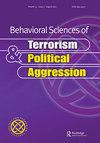Terrorism and economic growth in Africa: understanding the role of military expenditure
IF 1.3
Q2 POLITICAL SCIENCE
Behavioral Sciences of Terrorism and Political Aggression
Pub Date : 2021-10-10
DOI:10.1080/19434472.2021.1987967
引用次数: 8
Abstract
ABSTRACT Across African countries, terrorism has become a major challenge to socioeconomic development. While there are studies that have examined the influence of terrorism on economic growth, this study adds to the existing literature by investigating the role of military expenditure on the relationship between terrorism and economic growth in Africa. The study utilised a dataset comprising 24 African countries for which terrorism activities have increased substantially in the last decades. Utilising an instrumental variable Fixed Effects model with standard errors that account for cross-sectional dependence, serial correlation and group-wise heteroskedasticity, the study revealed that, (1) terrorism has a detrimental effect on economic growth in the selected African countries, (2) the interactive effect of military expenditure and terrorism on economic growth is significantly positive, (3) the net effect of military expenditure on the relationship between terrorism and economic growth is positive when the number of terrorism incidents act as a proxy for terrorism but negative when the number of terrorism fatalities acts as a proxy for terrorism. However, this negative effect is substantially lower when compared to the unconditional effect of terrorism on economic growth in Africa. Policy recommendations based on these findings are discussed.恐怖主义与非洲经济增长:了解军费开支的作用
摘要在非洲各国,恐怖主义已成为社会经济发展面临的重大挑战。虽然有研究考察了恐怖主义对经济增长的影响,但这项研究通过调查军事支出在恐怖主义与非洲经济增长之间关系中的作用,补充了现有文献。该研究使用了一个由24个非洲国家组成的数据集,这些国家的恐怖主义活动在过去几十年中大幅增加。利用一个具有标准误差的工具变量固定效应模型,该模型考虑了横截面依赖性、序列相关性和群体异方差,研究表明,(1)恐怖主义对选定非洲国家的经济增长有不利影响,(2)军费开支和恐怖主义对经济增长的交互作用显著为正,(3)当恐怖主义事件数量代表恐怖主义时,军费开支对恐怖主义与经济增长之间关系的净影响为正,而当恐怖主义死亡人数代表恐怖主义时则为负。然而,与恐怖主义对非洲经济增长的无条件影响相比,这种负面影响要低得多。讨论了基于这些调查结果的政策建议。
本文章由计算机程序翻译,如有差异,请以英文原文为准。
求助全文
约1分钟内获得全文
求助全文
来源期刊

Behavioral Sciences of Terrorism and Political Aggression
POLITICAL SCIENCE-
CiteScore
4.80
自引率
10.00%
发文量
27
 求助内容:
求助内容: 应助结果提醒方式:
应助结果提醒方式:


